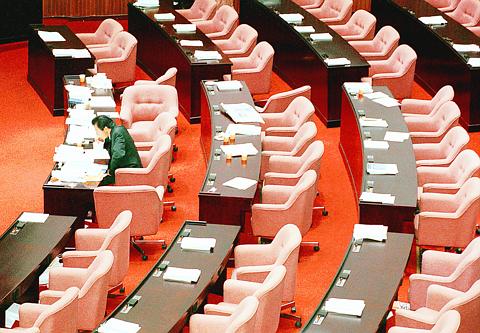Passage by the legislature of the Defense Law (國防法) finally con-fers on the military both legal status and governmental accountability.
This replaces decades of existence under organizational laws and executive orders without legislative basis.
Significantly, this and other laws and amendments passed will for the first time place the military structure under civilian control and, as a result, make it more accountable to the government.

PHOTO: CHIANG YING-YING, TAIPEI TIMES
Lawmakers also passed major revisions to the Defense Ministry Organizational Law (
Also passed were five laws mandating the establishment of a Coast Guard Administration (
The Defense Law features a clear description, in Article 8, of the relationship between the minister of national defense and the chief of the general staff: "The president passes orders down (
In the original version of the law, the president did not "pass down" but "gave" orders to the defense minister, who was then to pass them down to the chief of the general staff.
This change in wording is expected to ensure that the defense minister has the power to order the chief of the general staff to act as ordered by the president. It also indicates the possibility that the defense minister may choose to reject orders from the president under certain circumstances.
The Defense Law also establishes the main framework for the country's defense system, which will comprise the president, the National Security Council, the Executive Yuan and the Ministry of National Defense in a top-down model.
In Article 12 of the law, the defense minister is described as a "civilian," which is generally considered to mean future ministers will not be drawn from the military hierarchy.
The passage of revisions to the Defense Ministry Organization Law also marks a revolution in military organization, whose administrative and executive arms have long operated separately, as there was no clear legal formulation of their respective functions or status.
In the revised law, the current executive arm as represented by the chief of the general staff and his staff offices is placed directly under the control of the defense minister.
Until now, the chief of the general staff has always been higher in status than the minister, and has been more powerful, holding the power to command troops under orders directly from the president.
This imbalance in the military power structure, however, has effectively been removed with the chief of the general staff being clearly designated as a member of the defense minister's staff.
In practice, however, the chief of the general staff will have command of the troops, since the defense minister is expected to delegate such powers, freeing himself to concentrate on administrative affairs, a defense official said yesterday.
In like manner, the chief of the general staff will also delegate certain portions of his command to the heads of the army, air force, navy and other services, the official said.
Such a practice will not totally separate the administrative and executive systems, the official said, but at least the defense minister will be empowered within the executive system under his control, a power which has long been denied him.

DEFENDING DEMOCRACY: Taiwan shares the same values as those that fought in WWII, and nations must unite to halt the expansion of a new authoritarian bloc, Lai said The government yesterday held a commemoration ceremony for Victory in Europe (V-E) Day, joining the rest of the world for the first time to mark the anniversary of the end of World War II in Europe. Taiwan honoring V-E Day signifies “our growing connections with the international community,” President William Lai (賴清德) said at a reception in Taipei on the 80th anniversary of V-E Day. One of the major lessons of World War II is that “authoritarianism and aggression lead only to slaughter, tragedy and greater inequality,” Lai said. Even more importantly, the war also taught people that “those who cherish peace cannot

Taiwanese Olympic badminton men’s doubles gold medalist Wang Chi-lin (王齊麟) and his new partner, Chiu Hsiang-chieh (邱相榤), clinched the men’s doubles title at the Yonex Taipei Open yesterday, becoming the second Taiwanese team to win a title in the tournament. Ranked 19th in the world, the Taiwanese duo defeated Kang Min-hyuk and Ki Dong-ju of South Korea 21-18, 21-15 in a pulsating 43-minute final to clinch their first doubles title after teaming up last year. Wang, the men’s doubles gold medalist at the 2020 and 2024 Olympics, partnered with Chiu in August last year after the retirement of his teammate Lee Yang

The Philippines yesterday criticized a “high-risk” maneuver by a Chinese vessel near the disputed Scarborough Shoal (Huangyan Island, 黃岩島) in a rare incident involving warships from the two navies. The Scarborough Shoal — a triangular chain of reefs and rocks in the contested South China Sea — has been a flash point between the countries since China seized it from the Philippines in 2012. Taiwan also claims the shoal. Monday’s encounter took place approximately 11.8 nautical miles (22km) southeast” of the Scarborough Shoal, the Philippine military said, during ongoing US-Philippine military exercises that Beijing has criticized as destabilizing. “The Chinese frigate BN 554 was

The number of births in Taiwan fell to an all-time monthly low last month, while the population declined for the 16th consecutive month, Ministry of the Interior data released on Friday showed. The number of newborns totaled 8,684, which is 704 births fewer than in March and the lowest monthly figure on record, the ministry said. That is equivalent to roughly one baby born every five minutes and an annual crude birthrate of 4.52 per 1,000 people, the ministry added. Meanwhile, 17,205 deaths were recorded, resulting in a natural population decrease of 8,521, the data showed. More people are also leaving Taiwan, with net